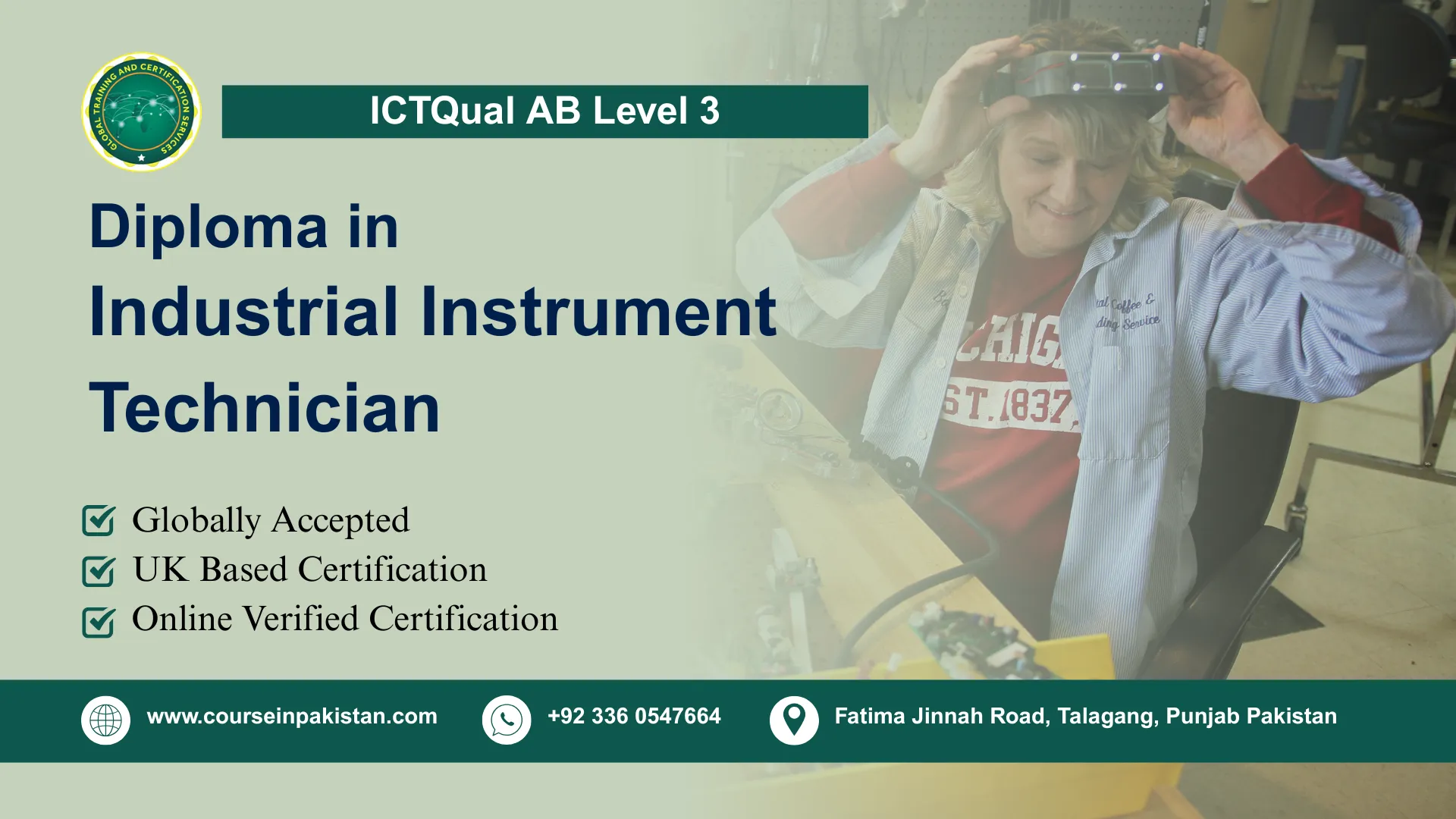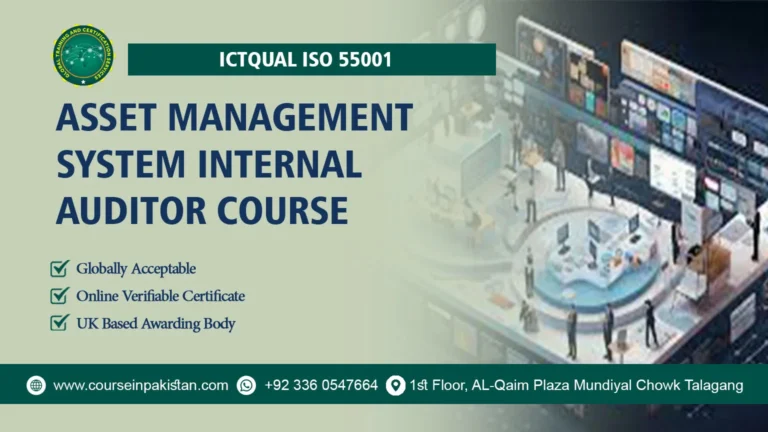
The ICTQual AB Level 3 Diploma in Industrial Instrument Technician is a comprehensive vocational program tailored to equip learners with the technical knowledge and practical skills required for success in industrial instrumentation and control systems. This diploma delivers an in-depth exploration of the principles, tools, and technologies that underpin the monitoring, measurement, and regulation of industrial processes. Learners will gain expertise in working with sensors, transmitters, control valves, and programmable logic controllers (PLCs), all of which are critical to maintaining operational efficiency and safety.
Learners enrolled in the ICTQual AB Level 3 Diploma in Industrial Instrument Technician will engage with a broad spectrum of instrumentation topics essential to modern industrial operations. These include process variables such as pressure, temperature, flow, and level; calibration techniques to ensure measurement accuracy; the selection and operation of control valves and sensors; and the programming and integration of programmable logic controllers (PLCs). The course is designed to blend rigorous theoretical instruction with immersive hands-on training, enabling students to work directly with industry-standard equipment and simulate real-world scenarios.
By the end of the program, participants will be equipped with a comprehensive set of skills to install, configure, maintain, and troubleshoot a wide range of industrial instrumentation systems. They will be capable of working confidently with sensors, transmitters, control valves, and programmable logic controllers across diverse sectors such as manufacturing, oil and gas, energy production, and chemical processing. Learners will also develop the ability to interpret technical documentation, apply safety protocols, and contribute effectively to multidisciplinary engineering teams. The diploma not only prepares graduates for immediate employment in technical roles but also lays a strong foundation for further academic progression, including advanced diplomas and degree-level studies.
Course Overview
The ICTQual AB Level 3 Diploma in Industrial Instrument Technician is structured to provide learners with a balanced mix of classroom learning and practical experience. Key modules include fundamentals of instrumentation, process measurement, industrial sensors and transducers, control systems, PLC programming, and safety practices. Each module is designed to build core competencies that align with industry standards and expectations.
This course is suitable for both newcomers to the field and existing technicians looking to upgrade their qualifications. Learners will gain the ability to interpret technical documentation, configure automated systems, and apply diagnostic techniques to resolve instrumentation faults. With a strong emphasis on safety, accuracy, and efficiency, the diploma prepares students to contribute effectively to multidisciplinary engineering teams and meet the demands of modern industrial environments.
Key Highlights of the Course:
- Industry-aligned curriculum covering instrumentation, automation, and control systems
- Hands-on training with sensors, transmitters, controllers, and PLCs
- Emphasis on safety standards and regulatory compliance
- Real-world simulation of industrial environments and troubleshooting scenarios
- Instruction from experienced professionals and technical experts
- Globally recognized qualification enhancing employability
- Pathways to advanced certifications and engineering degrees
Course Benefits
The ICTQual AB Level 3 Diploma in Industrial Instrument Technician offers a wide range of benefits that empower learners to succeed in the industrial sector. Below are the key advantages:
Technical Proficiency
- Develop expertise in installing, calibrating, and maintaining industrial instruments
- Gain practical skills in PLC programming and process automation
Career Advancement
- Qualify for technician roles in high-demand industries such as oil and gas, manufacturing, and energy
- Increase opportunities for promotion and higher-level responsibilities
Industry Readiness
- Be prepared to work in real-world industrial environments with confidence
- Learn to troubleshoot and resolve instrumentation faults efficiently
Professional Recognition
- Earn a respected diploma that validates your technical capabilities
- Stand out in competitive job markets with a specialized qualification
Academic Progression
- Build a foundation for further studies in engineering and automation
- Access higher-level certifications and specialized training programs
Whether you’re starting your journey or advancing your career, this diploma equips you with the knowledge, skills, and credentials to thrive as an industrial instrument technician.
Course Study Units
This qualification, the Level 3 Diploma in Industrial Instrument Technician, consists of 6 mandatory units.
- Fundamentals of Industrial Instrumentation
- Process Variables: Pressure, Temperature, Flow, and Level
- Instrument Calibration and Testing Techniques
- Industrial Sensors, Transducers, and Control Valves
- Programmable Logic Controllers (PLCs) and Process Automation
- Maintenance, Troubleshooting, and Industrial Safety
Learning Outcomes
The Level 3 Diploma in Industrial Instrument Technician is designed to provide learners with a robust foundation in instrumentation and control systems used across various industrial sectors. Each unit focuses on developing specific competencies that are essential for performing technical roles in process automation, instrumentation maintenance, and industrial safety. Below are the detailed learning outcomes for each unit.
Fundamentals of Industrial Instrumentation
- Understand the role and significance of instrumentation in industrial process control.
- Identify key components such as sensors, transmitters, controllers, and actuators.
- Explain the principles of measurement, signal transmission, and control loop dynamics.
- Differentiate between analog and digital instrumentation systems.
- Interpret basic instrumentation diagrams, symbols, and technical documentation.
- Recognize industry standards and terminology used in instrumentation practices.
Process Variables: Pressure, Temperature, Flow, and Level
- Define the four primary process variables and their importance in industrial operations.
- Explore various measurement techniques and instruments used for each variable.
- Analyze the impact of variable fluctuations on system performance and safety.
- Select appropriate instruments based on process conditions and operational requirements.
- Calibrate and validate instruments to ensure accurate readings and control.
- Interpret data from process instruments for monitoring and decision-making.
Instrument Calibration and Testing Techniques
- Understand the principles and importance of calibration in industrial instrumentation.
- Perform standard calibration procedures using appropriate tools and reference standards.
- Identify and correct common calibration errors and deviations.
- Document calibration results in compliance with industry protocols and traceability standards.
- Conduct performance testing to verify instrument functionality under operating conditions.
- Apply quality assurance practices to maintain instrument reliability and accuracy.
Industrial Sensors, Transducers, and Control Valves
- Explain the working principles of various industrial sensors and transducers.
- Select suitable sensors and transducers for specific process applications.
- Understand the function, types, and characteristics of control valves used in automation.
- Analyze valve performance factors such as flow capacity, response time, and control accuracy.
- Integrate sensors and valves into control systems for effective process regulation.
- Troubleshoot common issues related to sensor and valve operation.
Programmable Logic Controllers (PLCs) and Process Automation
- Understand the architecture, components, and operation of programmable logic controllers.
- Develop basic PLC programs using ladder logic and function block diagrams.
- Interface PLCs with field devices such as sensors, actuators, and control valves.
- Diagnose and resolve common PLC faults and communication errors.
- Explore the role of PLCs in distributed control systems and SCADA environments.
- Implement automation strategies to enhance process efficiency and reliability.
Maintenance, Troubleshooting, and Industrial Safety
- Apply preventive and corrective maintenance techniques for instrumentation systems.
- Use diagnostic tools and methods to identify and resolve faults in control systems.
- Understand industrial safety standards, hazard identification, and risk mitigation practices.
- Comply with workplace safety regulations and operational protocols.
- Maintain accurate records of maintenance, troubleshooting, and safety inspections.
- Promote a culture of safety, reliability, and continuous improvement in industrial environments.
By mastering the learning outcomes across these six units, learners will be equipped with the technical knowledge, practical skills, and safety awareness required to excel as industrial instrument technicians. This qualification prepares individuals for real-world challenges and opens doors to rewarding careers and further academic progression in the field of instrumentation and automation.
Who is This Course For?
This diploma is designed for individuals who are motivated to build a career in industrial instrumentation and automation. The ideal learner should possess the following qualities:
- Interest in Engineering and Technology Enthusiastic about industrial systems, automation, and process control.
- Basic Technical Understanding Comfortable with mathematics, physics, and interpreting technical diagrams.
- Hands-On Learning Preference Enjoys practical work, using tools, and solving real-world technical problems.
- Career-Focused Mindset Committed to pursuing a stable and rewarding career in industrial sectors.
- Attention to Detail and Safety Values precision, safety protocols, and compliance with industry standards.
This course is suitable for school leavers, entry-level technicians, and professionals seeking to upskill in instrumentation and control.
Future Progression
- Graduates of this diploma can pursue a variety of career and professional development opportunities, including:
- Employment as Industrial Instrument Technicians in manufacturing, oil and gas, and energy sectors.
- Advancement to Automation Specialist or Control Systems Technician roles.
- Opportunities in Field Service Engineering and Maintenance Supervision.
- Eligibility for technical team leadership positions with experience.
- Access to advanced certifications in instrumentation, SCADA, or industrial automation.
Academic Pathways:
- This qualification also supports further academic growth in engineering and technology:
- Progression to a Diploma or Advanced Diploma in Instrumentation or Automation Engineering.
- Enrollment in Higher National Certificate (HNC) or Higher National Diploma (HND) programs.
- Entry into a Bachelor’s Degree in Industrial Automation, Mechatronics, or Electrical Engineering.
- Participation in specialized short courses in PLC programming, SCADA systems, or control theory.
The ICTQual AB Level 3 Diploma in Industrial Instrument Technician is a career-focused program that blends technical theory with practical application. It equips learners with the skills needed to install, maintain, and troubleshoot industrial instrumentation systems while emphasizing safety and precision. Whether you’re entering the field or advancing your current role, this diploma provides a strong foundation for long-term success in industrial automation and control. With pathways to employment, certification, and further education, it opens doors to a dynamic and rewarding career.






